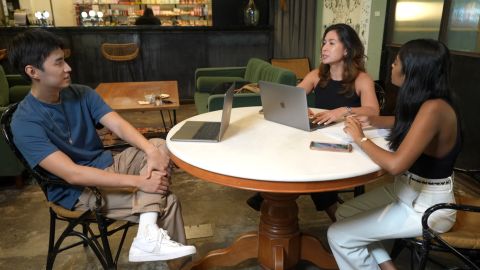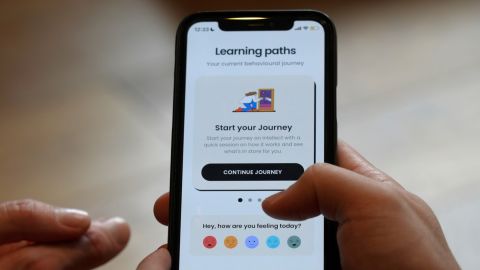Singapore
CNN Business
—
Many Asian countries introduced tougher Covid-19 restrictions than in other continents, a reality that has caused concerns about elevated levels of stress, anxiety and isolation. Now, a number of young entrepreneurs are leveraging technology to provide greater access to mental healthcare there.
In July, Singapore-based Intellect raised $20 million in its Series A funding, the largest amount raised by a mental health start-up in Asia.
Founded in 2019, Intellect runs a mobile app that regularly checks in on users’ mood, provides rescue sessions and exercises that tailor to their needs, and allows them to connect with therapists in real time if needed.
“The traditional form of therapy is in-person and on-on-one, and it is hard to scale,” said Theodoric Chew, the 26-year-old co-founder of Intellect. “When technology comes in, we can scale access to mental care to everyone.”
The start-up now serves more than 3 million users across the Asia-Pacific region in 15 languages since services began in early 2020.
Chew said he was inspired to try to popularize mental healthcare after battling a panic attack when he was 16 years old.
“I saw first-hand how therapy and working with professionals helped me become better,” he said. “On the flip side, I saw a lot of people struggling across the region – not clinically, but not having the right tools or know-how to access care.”
While Intellect was founded before the pandemic, it quickly grew in popularity as companies became aware of their employees’ mental health as Covid-19 related lockdown and quarantine measures were imposed.
“A lot of people were thrown into an array of things – anxiety of the pandemic, being locked up, and getting stay-home notices,” he said. “What has changed fundamentally was that mental health is no longer just a nice-to-have element that companies should consider, it’s something that’s needed across the board today.”
“It does benefit companies in very real ways … because if you’re not feeling well mentally, you tend to not perform as well,” he said.
Justin Kim, CEO and co-founder of Ami, another digital mental healthcare start-up based in Singapore and Jakarta, agreed that there’s a need to scale mental health offerings.
“Many companies are spending millions of dollars a year and paying for gym memberships. But why don’t people invest into their mental health the same way? It’s because there are no resources that are being offered to them, that’s just as accessible and affordable,” he added.

Since the start-up was founded in January this year, it has raised at least $3 million from a number of investors, including Meta, the owner of Facebook.
Kim’s team has been working on developing an app that would allow users to text or call mental health coaches confidentially at any time – without having to make prior appointments. He said this allows users to seek professional help whenever they need it in the most efficient way.
Both Chew and Kim are targeting employers in their business models – companies can pay for a subscription and workers will have unlimited access to their services, which are kept private from their bosses.
Alistair Carmichael, an associate partner at McKinsey & Company, said employers will benefit from better mental health in their workforce. “The impacts of poor mental health outcomes are significant. … If we focus on the employment and organizational level, those impacts can be things like presenteeism, absenteeism, lost productivity, lost engagement and attrition,” he said.
Depression and anxiety disorders have cost the global economy $1 trillion each year in lost productivity, the World Health Organization has estimated. And a report by the WHO in March showed the global prevalence of anxiety and depression increased by 25% during the first year of the pandemic.
Chew said Intellect is attempting to close the gap by proactively safeguarding mental wellbeing before symptoms get worse. When employees open the app, the system asks them how they feel at the moment. Mini “rescue sessions” are also provided to users who are experiencing a rough time, while live therapy sessions are also available for those who require them.

The app features numerous learning programs for users to overcome mental roadblocks, such as self-esteem issues, depression or procrastination. A journal function guides users through writing what’s on their mind, while a “mood timeline” keeps track of their stress levels.
Since launching the app, Intellect has served a number of high-profile corporate clients such as Dell, Foodpanda, and Singaporean communications conglomerate Singtel, Chew said, which allowed Intellect to expand from a team of two to 80.
Kim, whose start-up has been building a prototype, said employers could also benefit by identifying trends and general concerns among their workforces.
“With employees’ consent, we do share aggregated levels of data. And that offers employers a birds’ eye perspective of what their employees are actually struggling with, that they need to deep dive on,” he said.
“But we never identify who said that, because we don’t want employees to feel like this isn’t a safe space where they can freely address concerns they have.”
Karen Lau, a Hong Kong-based clinical psychologist with mental health initiative Mind HK, said addressing mental health in Asia comes with unique challenges.
“In Asian contexts, many cultures tend to uphold values such as honor, pride, and a concept of face,” she said. “Mental illness is usually viewed and judged as a sign of weakness and a source of shame for the family.”
“I think when it comes to mental health, just like your physical health, every issue is easier to prevent than fixed,” Kim said. “If people get out there and admit and celebrate the fact that they’re receiving coaching or services to invest in their mental health, it’s going to normalize the practice.”
Chew said one of his goals is to break social stigma and build a new mental healthcare system for the Asia-Pacific region.
“Mental health has long had a stigma across Asia, whereby traditionally we’ve seen it as a clinical issue, a crisis,” he said. “We see mental health just as important as physical health. You and I face things like stress, burnout, sleep issues, and relationship struggle as well. That’s where actually a lot of us should start working on our mental wellbeing.”